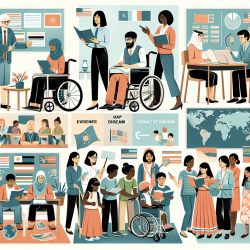Here are key takeaways and actionable steps for practitioners:
Key Findings from the Research
- Teacher Attitudes and Understanding: Many interventions focus on changing teacher attitudes and understanding of disabilities. Positive changes in teacher attitudes are foundational for successful inclusive education.
- Pedagogical Practices: Effective professional development programs equip teachers with inclusive pedagogical practices, leading to improved learning outcomes for students with disabilities.
- Gaps in Mental Health Support: Only three studies reported interventions aimed at supporting mental health among students with disabilities, highlighting a critical gap in current research and practice.
- Behavioral Support: No studies reported on how teachers could support positive student behavior, indicating another significant gap that needs to be addressed.
Actionable Steps for Practitioners
- Enhance Attitudinal Training: Invest in professional development programs that focus on changing teacher attitudes towards students with disabilities. Utilize evidence-based strategies to foster a more inclusive mindset among educators.
- Adopt Inclusive Pedagogical Practices: Implement training programs that provide teachers with practical, inclusive teaching strategies. Focus on techniques that have shown positive impacts on student learning outcomes.
- Address Mental Health Needs: Develop and incorporate mental health support strategies within professional development programs. Teachers should be equipped to identify and support the mental health needs of students with disabilities.
- Focus on Positive Behavioral Support: Create training modules that teach teachers how to support positive student behavior. Evidence suggests that this area is under-researched and could significantly benefit students with disabilities.
Encouraging Further Research
While the current evidence provides valuable insights, there is a need for more rigorous studies, particularly those focusing on mental health support and behavioral interventions. Practitioners are encouraged to contribute to this growing body of research by documenting and publishing their experiences and outcomes from implementing inclusive education strategies.
By adopting these evidence-based strategies and contributing to further research, practitioners can significantly improve the educational experiences and outcomes for students with disabilities in the Asia-Pacific region.
To read the original research paper, please follow this link: Teacher professional development for disability inclusion in low- and middle-income Asia-Pacific countries: An evidence and gap map.










